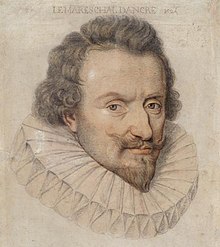Concino Concini
Concino Concini, Marquis d'Ancre (born November 23, 1569 in Florence , † April 24, 1617 in Paris ), also known as Marshal d'Ancre , was the most influential man in France during the reign of Maria de 'Medici .
Life
The Italian adventurer Concini, of noble origin from Tuscany , came to Paris in the court of Queen Maria de 'Medici. In 1601 he married her foster sister and lady-in-waiting Leonora Dori Galigaï . His influence on the queen was so great that Henry IV threatened several times to send him into exile.
After Heinrich's murder, he rose to become the regent's most important advisor . In 1613 he was marshal of France and “showered” with her favor. He was practically the head of government of the country, but brought the nobility and population against him, as he was massively enriched. He and his wife were considered arrogant, surrounded by an Italian camarilla . The young Louis XIII. even after Ludwig had been crowned king, he kept them away from all affairs of state. Concini's efforts to strengthen the central authority and to break the power of the nobility failed because of his inability and his unpopularity. Like no other courtier, Concini was a figure of public interest as the regent's “ courtisan ”. Hundreds of publications combined xenophobia , social prejudice, allegations of corruption and the suspicion of having been involved in the death of the king.
Ludwig developed a growing aversion to Concino Concini, and in 1617 Ludwig's favorite, Charles d'Albert, duc de Luynes , put an end to this situation by having Concini arrested by the palace guards. On the way to the inner courtyard of the Louvre , he was shot, trapped between two gates, by the captain of the royal guard Nicolas de L'Hospital and some of his companions. His body was buried in a hurry, but was taken out and desecrated by the Parisians. His wife was executed after a trial.
Through Concini Maria de 'Medici became aware of the young Richelieu , whom she made minister.
literature
- Henri Alméras: Concini Maréchal d'Ancre . Berger-Levrault, Paris 1928.
- George Delamare: Concino Concini. Un aventurier maître du royaume de France . Denoël, Paris 1946.
- Hélène Duccini: Concini. Grandeur et misère du favori de Marie de Médicis . Michel, Paris 1991, ISBN 2-226-05265-8 .
- Auguste Jal : Dictionnaire critique de biographie et d'histoire. Errata et supplément pour tous les dictionnaires historiques, d'après des documents authentiques inédits . Plon, Paris 1867, pp. 415-417 ( online ).
- W. Monter: Concini, Concino. In: Alberto M. Ghisalberti (Ed.): Dizionario Biografico degli Italiani (DBI). Volume 27: Collenuccio – Confortini. Istituto della Enciclopedia Italiana, Rome 1982, pp. 725-730.
- Jean Tracou, Pierre Henry: Livre d'or des maréchaux de France. 1190-1952 . Lacour, Casablanca [et al.] [1960], p. 89.
Web links
- Illustration by Frans Hogenberg from 1617: Assassination of Concino Concini, also known as Marschall dAncre ( digitized version )
Individual evidence
- ↑ Klaus Malettke: The Bourbons. Volume 1: From Heinrich IV. To Louis XIV. 1589–1715. Kohlhammer, Stuttgart 2008 ISBN 978-3-17-020581-9 , p. 72.
- ^ A b Peter Claus Hartmann (Ed.): French kings and emperors of the modern age. From Louis XII. until Napoleon III. 1498-1870. Beck, Munich 2006, ISBN 3-406-54740-0 , pp. 174f.
- ^ Winfried Engler (Ed.): France at the Free University. History and actuality. Steiner Verlag, Stuttgart 1997, ISBN 3-515-06971-2 , p. 162.
- ↑ Klaus Malettke: The Bourbons. Volume 1: From Heinrich IV. To Louis XIV. 1589–1715. Kohlhammer, Stuttgart 2008 ISBN 978-3-17-020581-9 , p. 81.
- ^ Winfried Engler (Ed.): France at the Free University. History and actuality. Steiner Verlag, Stuttgart 1997, ISBN 3-515-06971-2 , p. 163.
| personal data | |
|---|---|
| SURNAME | Concini, Concino |
| ALTERNATIVE NAMES | Marquis d'Ancre |
| BRIEF DESCRIPTION | French general and Marshal of France of Italian origin |
| DATE OF BIRTH | November 23, 1569 |
| PLACE OF BIRTH | Florence |
| DATE OF DEATH | April 24, 1617 |
| Place of death | Paris |

